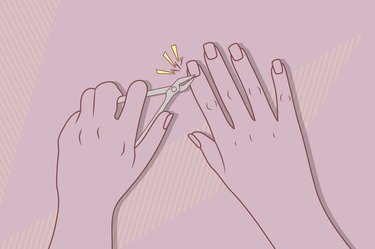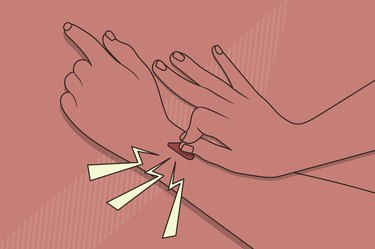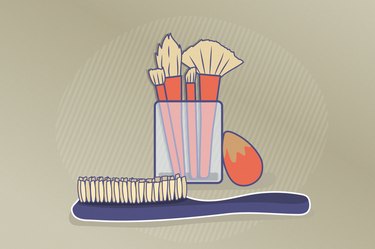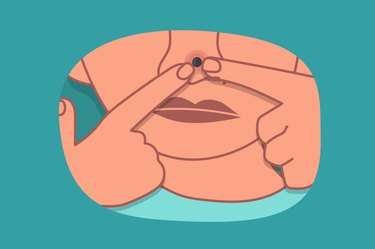
Sure, clickety-clacking a fresh set of nails on a hard surface is pretty gratifying. And there's something to be said about the sleek, clean look of a deep nail bed. But to achieve this look, your manicurist is likely taking a trimmer to your cuticles.
Your cuticle is the extra layer of skin around the bottom of the nail, covering the nail bed, according to the American Academy of Dermatology Association (AAD). Essentially, your cuticles act like a barrier between the root of your nails (which are especially sensitive) and the outside world.
Video of the Day
Video of the Day
Cutting away this skin reveals more of the nail surface, allowing your manicurist to polish all the way to the nail base. But aesthetics aside, is it bad to cut your cuticles?
Effects of Cutting Your Cuticles
1. Risk of Infection
As we mentioned, your cuticles are a barrier between your nail bed and anything your fingers may touch. When you cut away this protective skin, your nails become more susceptible to infection, per the AAD. This is especially true if the cuticles are cut so far as to draw blood.
Whenever you trim or cut away your cuticles, you reveal your nail bed and root to the elements, making it easier for dirt and bacteria to get inside your body and cause an infection. And considering your fingers and nails touch so many things throughout the day, the risk is relatively high.
2. Nail Damage
Cutting your cuticles can also cause damage or injury to your nail bed. Although nail bed injury usually isn't too severe, it can cause deformities in your nail or cause your nail to crack and break, according to the American Society for Surgery of the Hand.
Additionally, infection can lead to damage to the nail that may be permanent.
Should You Push Back Your Cuticles Instead?
Instead of totally cutting off or trimming cuticles, some people prefer to push the cuticles back using a flat-edged tool. But you should actually avoid this practice, too, recommends the AAD.
Although it's not as damaging as cutting and trimming, pushing back your cuticles still leaves your nail bed exposed to the elements, putting you at risk for infection.
The look of a pushed-back or trimmed cuticle may be appealing but it's best to just leave them alone.
How to Care for Your Cuticles
1. Moisturize
Moisturizing is one way to give your nails some TLC and help rehab damaged cuticles, according to the Mayo Clinic. You can rub any standard hand lotion into your nails, nail beds and cuticles to help promote healthy skin.
And there are severe cuticle damage ointments and lotions you can try, too.
Cuticle Care Products to Try
- Badger Cuticle Care Soothing Shea Butter Cuticle Balm ($15.93 for a 2-pack, Amazon)
- Burt's Bees Lemon Butter Cuticle Cream ($17.46 for a 3-pack, Amazon)
- C CARE Milk and Honey Cuticle Revitalizing Oil ($8.79, Amazon)
2. Use Clean Tools
Always disinfect your nail tools before use in order to kill germs and prevent infection, recommends the AAD. You should clean your personal tools at least once a month with 70 to 90 percent isopropyl alcohol. Scrub your nail clippers and scissors thoroughly, rinsing with hot water afterward.
Those who get their nails done at a salon should verify that the technician cleans their tools properly. Today, it's pretty common to see your technician remove fresh, sterilized nail tools from a sealed package before they get to work.
3. Avoid Artificial Nails
You may love the look of long nails, but acrylics aren't only bad for your nails, they're not so nice to your cuticles either, according to the AAD.
When you get acrylic nails, part of the process involves filing down your real nail (usually using a drill). During this process, a technician usually removes your cuticles, too, to make sure the fake nail has an even base.
So, How Bad Is It Really to Cut Your Cuticles?
In the grand scheme of health concerns, your cuticles probably don't top the list. Nevertheless, cutting your cuticles is a practice that's easily avoidable and best for your overall health.
Although trimming this skin every so often (like for special occasions) probably won't do much harm, it's best to leave your cuticles alone.
Is this an emergency? If you are experiencing serious medical symptoms, please see the National Library of Medicine’s list of signs you need emergency medical attention or call 911.



